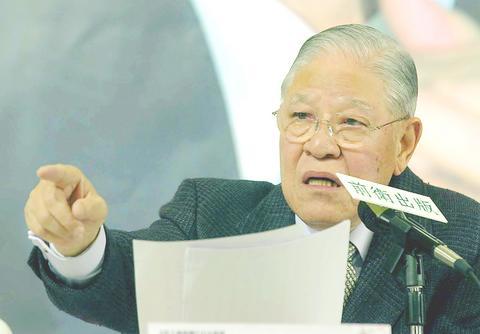Former president Lee Teng-hui (
Lee was speaking at an event to mark the release of the Chinese-language version of his book Bushido Kaidai (武士道解題), a commentary on the traditional samurai spirit.

PHOTO: CHIANG YING-YING, TAIPEI TIMES
Lee said this essential part of Japanese culture has been lost, resulting in Japan's appeasing China at the expense of Taiwan's interests.
"The old Japanese values of the samurai have long since disappeared and the Japanese have become weak. Whatever China opposes, Japan dare not say something different," Lee said.
"When China opposes Taiwan's referendum plan, Japan reacts in a fearful way and even allowed a low-ranking official of the Interchange Association [Japan's representative office in Taiwan] to secretly deliver the Japanese government's concerns."
Lashing out at Japan's bowing to pressure from China, Lee said, "The top authority of Japan may not act in an obvious way to make concessions to China, but lower-level government officials will then do something to appease China."
Lee was referring to a representative of the Interchange Association, Katsuhisa Uchida (內田勝久), who visited Presidential Office Secretary-General Chiou I-jen (邱義仁) late last month to express Tokyo's dissatisfaction with the referendum plan.
Lee said Japan will act against Taiwan as compensation for its policies that irritate China.
He said Japanese Prime Minister Junichiro Koizumi's visits to the Yasukuni shrine, a symbol of Japanese militarism and a focal point for China's anti-Japanese sentiment, and a recent visit to Taiwan by former prime minister Yoshiro Mori (森喜朗) are the main reasons why Japan is willing to grant China concessions.
Lee urged the Japanese people to restore the samurai value of honesty, adding the weakness and appeasement Japan has shown goes against the samurai spirit.
He also criticized Japan's vacillation, saying Japan's Constitution was based on the US Constitution -- the same situation Taiwan faces by using the Republic of China Constitution, which was drafted in China and brought to Taiwan in 1949.
At yesterday's book release, Lee urged the people of Taiwan to find their own cultural spirit. He called on people to insist on "Taiwan-centric" beliefs and to further efforts to build a Taiwanese identity.
The book was originally written in Japanese by Lee and was first published in Japan in 2002.
Born in Taiwan during the Japanese colonial era, the former president received a Japanese education for more than 20 years. His interpretation and observation for the book was inspired by Japanese pundit Nitobe Inazo, who completed Bushido, the Soul of Japan in 1900.

ENDEAVOR MANTA: The ship is programmed to automatically return to its designated home port and would self-destruct if seized by another party The Endeavor Manta, Taiwan’s first military-specification uncrewed surface vehicle (USV) tailor-made to operate in the Taiwan Strait in a bid to bolster the nation’s asymmetric combat capabilities made its first appearance at Kaohsiung’s Singda Harbor yesterday. Taking inspiration from Ukraine’s navy, which is using USVs to force Russia’s Black Sea fleet to take shelter within its own ports, CSBC Taiwan (台灣國際造船) established a research and development unit on USVs last year, CSBC chairman Huang Cheng-hung (黃正弘) said. With the exception of the satellite guidance system and the outboard motors — which were purchased from foreign companies that were not affiliated with Chinese-funded

PERMIT REVOKED: The influencer at a news conference said the National Immigration Agency was infringing on human rights and persecuting Chinese spouses Chinese influencer “Yaya in Taiwan” (亞亞在台灣) yesterday evening voluntarily left Taiwan, despite saying yesterday morning that she had “no intention” of leaving after her residence permit was revoked over her comments on Taiwan being “unified” with China by military force. The Ministry of the Interior yesterday had said that it could forcibly deport the influencer at midnight, but was considering taking a more flexible approach and beginning procedures this morning. The influencer, whose given name is Liu Zhenya (劉振亞), departed on a 8:45pm flight from Taipei International Airport (Songshan airport) to Fuzhou, China. Liu held a news conference at the airport at 7pm,

GRIDLOCK: The National Fire Agency’s Special Search and Rescue team is on standby to travel to the countries to help out with the rescue effort A powerful earthquake rocked Myanmar and neighboring Thailand yesterday, killing at least three people in Bangkok and burying dozens when a high-rise building under construction collapsed. Footage shared on social media from Myanmar’s second-largest city showed widespread destruction, raising fears that many were trapped under the rubble or killed. The magnitude 7.7 earthquake, with an epicenter near Mandalay in Myanmar, struck at midday and was followed by a strong magnitude 6.4 aftershock. The extent of death, injury and destruction — especially in Myanmar, which is embroiled in a civil war and where information is tightly controlled at the best of times —

Taiwan was ranked the fourth-safest country in the world with a score of 82.9, trailing only Andorra, the United Arab Emirates and Qatar in Numbeo’s Safety Index by Country report. Taiwan’s score improved by 0.1 points compared with last year’s mid-year report, which had Taiwan fourth with a score of 82.8. However, both scores were lower than in last year’s first review, when Taiwan scored 83.3, and are a long way from when Taiwan was named the second-safest country in the world in 2021, scoring 84.8. Taiwan ranked higher than Singapore in ninth with a score of 77.4 and Japan in 10th with